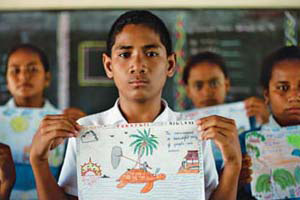The low-lying Pacific island nation of Tuvalu may be one of the first casualties of a warming world. It’s also one of the smallest countries on earth, with no coveted natural resources or strategic clout to speak of. So when economic powerhouses balk at the idea of deep emissions cuts, what’s a small player on the world stage to do? The answer: kick up a fuss. On Wednesday Tuvalu’s longtime climate adviser, an Australian named Ian Fry, grabbed the spotlight at Copenhagen by halting talks until negotiators considered a new, legally binding climate protocol that Tuvalu wants adopted instead of merely a political agreement. Tuvalu’s alternative treaty outlines more drastic emissions reductions aimed at preventing temperatures from rising by more than 1.5 degrees Celsius.
In the current issue of the magazine, I have a piece about Tuvalu’s plight. One thing I realized while reporting the story is that for a vulnerable, isolated, powerless nation, political theater is one of the few weapons available. That’s why imperiled Tuvalu previously pulled a world-class guilt trip by announcing plans to go completely carbon neutral, and why, at a previous round of pre-Copenhagen climate talks, government ministers from the similarly endangered Maldives convened a cabinet meeting underwater.
But this particular maneuver may have some unintended consequences. It’s no surprise that industrialized nations opposed the deep cuts outlined in its alternative treaty, which was ultimately rejected. But not before the proposal drove a wedge in the assembled developing countries at the summit—a division that could affect negotiations as the talks continue. While Tuvalu’s proposal won favor with the Association of Small Island States—many of which are sitting in the same precarious boat when it comes to rising sea levels—and some African countries, it was opposed by large developing economies like India, Brazil, Saudia Arabia, and China. That’s because those countries want to avoid hard commitments for their own reductions. The G77—the bloc of poorer nations—usually bands together at big international talks. Now, Tuvalu’s plea for a more ambitious effort to combat climate change—one that would give it a shot at survival—has exposed a rift in their ranks.







